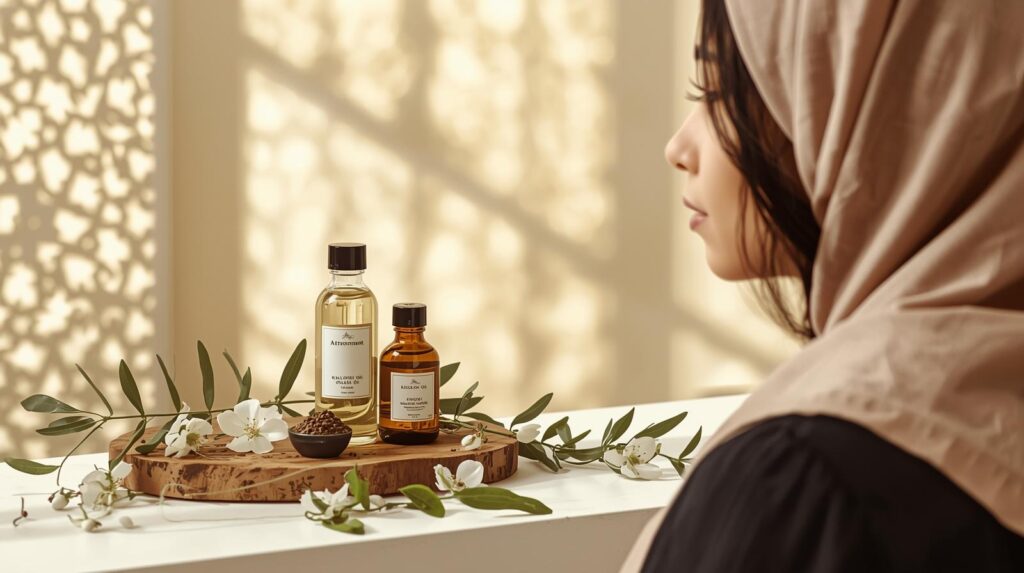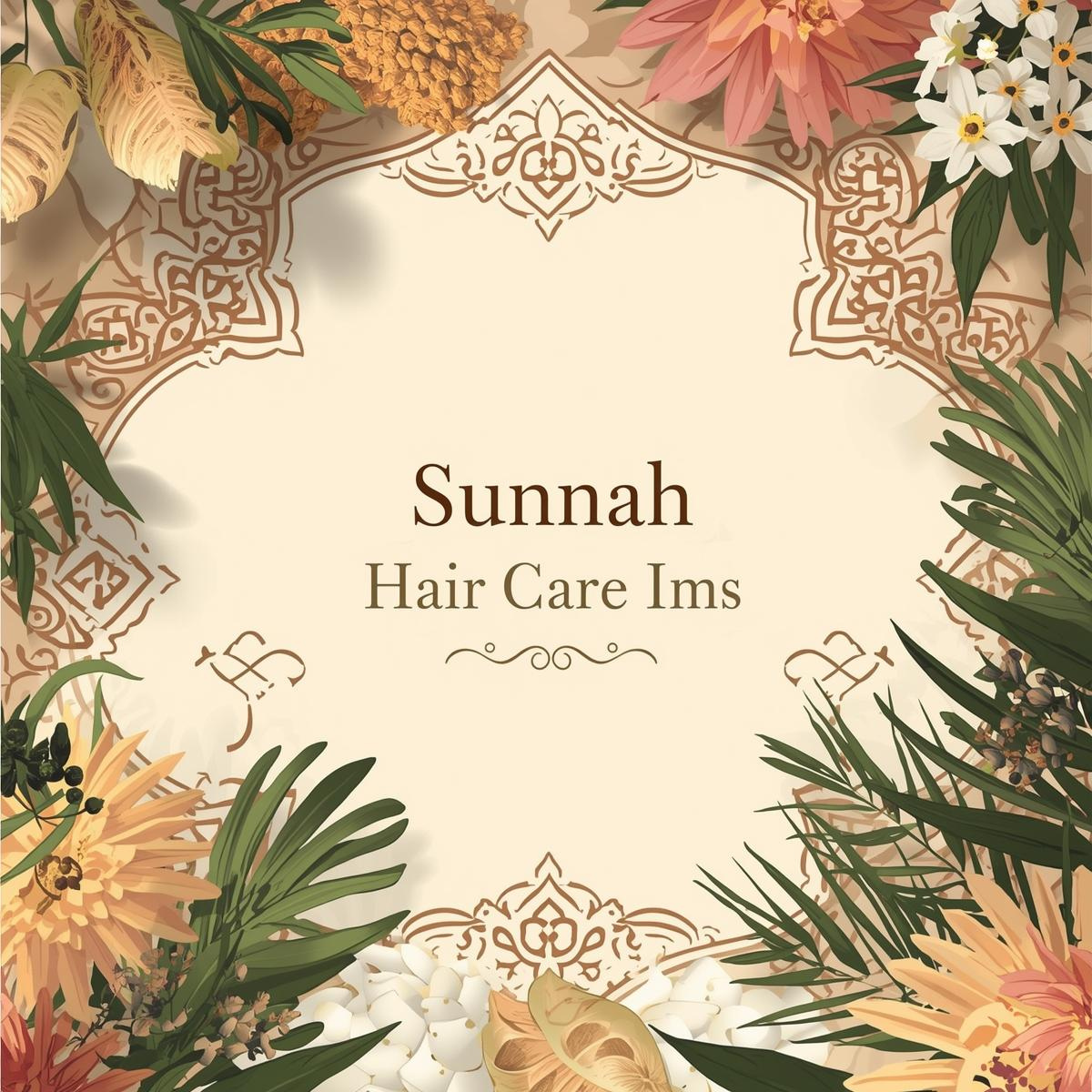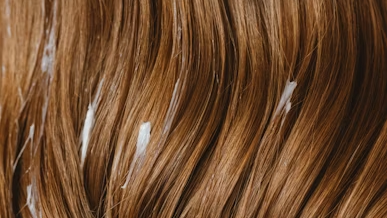Islamic Hair Care Secrets: Sunnah Remedies, Halal Products & Modern Solutions
Introduction
Hair is more than beauty—it is a trust (Amanah) from Allah. In Islam, maintaining one’s hair is part of personal hygiene and dignity.
The Prophet encouraged believers to stay clean, groom their hair, and use oil regularly.
Prophet Muhammad ﷺ said:
“Whoever has hair should honor it.”
(Sunan Abu Dawood 4163)
From this beautiful Sunnah, we learn that caring for our hair is a form of worship and gratitude. Today, we’ll explore Islamic teachings, Sunnah remedies, and halal modern products that bring together faith, nature, and science.

1. The Spiritual Importance of Hair in Islam
- In the Qur’an and Hadith, cleanliness is half of faith (“At-tahuru shatru al-iman”). Hair care falls under this principle.
- Covering hair (for women) is a command of modesty and identity.
- Men are encouraged to keep their hair tidy, oil it, and avoid arrogance or imitation of disbelievers.
Hadith:
“The Messenger of Allah used to pour water on his head three times.”
(Sahih Muslim 235)
Spiritual insight: Taking care of your hair is not vanity—it’s an act of thankfulness and discipline.
2. Sunnah Practices for Strong, Healthy Hair
Islam provides timeless grooming practices that modern science now proves beneficial:
Oiling the Hair
- The Prophet loved olive oil and recommended it for both food and external use.
“Eat olive oil and anoint yourselves with it, for it is from a blessed tree.”
(Tirmidhi 1851)
- Other natural Sunnah oils: black seed oil (Nigella sativa), sesame oil, and castor oil.
Combing & Cleanliness
- Combing the hair daily prevents tangling and dandruff.
“The Messenger of Allah used to oil his hair and comb it regularly.”
(Ibn Majah 3624)
Using Natural Fragrances
- Musk and rose oil were used by early Muslims to perfume the hair.
- Always choose halal, alcohol-free fragrances.
3. Common Hair Problems Among Muslims
Even with good habits, modern lifestyle and hijab routines cause issues:
- Hijab hair falls out due to lack of air circulation and dryness.
- Hair thinning from stress, diet, and pollution.
- Dandruff & scalp itch due to humidity or synthetic shampoos.
- Grey hair—which the Prophet advised not to pluck but to honor.
“Do not pluck grey hair, for it will be light for you on the Day of Judgment.”
(Abu Dawood 4202)
4. Islamic Remedies for Hair Growth & Strength
These Sunnah-based ingredients are scientifically proven to help:
Black Seed Oil (Habba-tus-Sauda)
- Contains thymoquinone, a natural antioxidant.
- Stimulates follicles and reduces inflammation.
“In black seed there is healing for every disease except death.” (Bukhari 5687)
Olive Oil
- Deeply moisturizes and strengthens roots.
- Rich in vitamin E and fatty acids.
Henna (Lawsonia inermis)
- Natural conditioner, antifungal, and hair colorant.
- The Prophet used henna and recommended it to cover grays.
Sunnah Diet for Healthy Hair
- Eat dates, figs, milk, honey, barley soup, cucumbers, and pomegranates.
- Avoid excess junk, sugar, and stress—they weaken hair and faith alike.
5. Modern Halal Hair Solutions
Combine faith and modern care for best results:
Halal Hair Oils & Shampoos
Look for products free from alcohol, gelatin, and animal-derived ingredients.
Examples:
- “Hemani Black Seed Oil”
- “Al Haramain Olive Hair Serum”
- “Faith in Nature Halal Shampoo”
Halal Hair Dyes
Use plant-based dyes (henna, indigo) or brands with halal certification.
Halal Hair Vitamins
- Biotin, zinc, and vitamin D from halal-certified sources.
- Recommended brands: Nature’s Bounty Halal Line, Muslimah Health Supplements.
6. Hijab Hair Fall & Care Tips
Many Muslim women face hair damage under the hijab—follow these Sunnah-friendly solutions:
- Oil at night, wash in the morning.
- Use a cotton or satin underscarf to reduce friction.
- Let hair breathe after removing hijab.
- Use mild, halal shampoo with natural oils.
- Diet + sleep + dua—spiritual and physical balance.
“Indeed, the body has a right over you.” (Bukhari 5199)
7. FAQs – Islamic Hair Care Questions
Q1: Is not covering hair haram in Islam?
→ Yes, covering hair is an act of modesty and obedience to Allah (Surah An-Nur 24:31).
Q2: Can men grow long hair?
→ Yes, as long as it’s neat and clean. The Prophet had hair that reached his shoulders.
Q3: Is hair dye halal?
→ Yes, if free from haram ingredients. Avoid black dye for deceitful purposes (as mentioned in hadith).
Q4: Can women trim their hair?
→ Allowed if not imitating men and with husband’s permission (for married women).
Conclusion
Hair is not just beauty—it’s Ibadah (worship) when cared for with sincerity.
Follow the Sunnah, use halal modern products, and remember the Prophet’s advice:
“Verily, Allah is beautiful and loves beauty.” (Muslim 91)
Combine faith, nature, and science—and your hair will reflect your gratitude to Allah.



